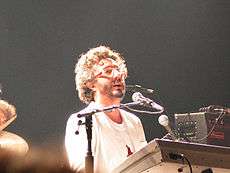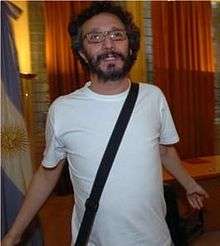Fito Páez
| Fito Páez | |
|---|---|
.jpg) Fito Páez in 2014 | |
| Background information | |
| Birth name | Rodolfo Sáenz Ávalos |
| Born |
13 March 1963 Rosario, Argentina |
| Genres |
Rock Pop |
| Occupation(s) | singer-songwriter, film director |
| Years active | 1979–present |
| Labels | Warner Music/Distribuidora Belgrano Norte/Sony Music |
| Website | Official website |
Rodolfo Sáenz Ávalos, popularly known as Fito Páez (Spanish pronunciation: [ˈfito ˈpaes]; born 13 March 1963), is an Argentine popular rock and roll pianist, lyricist, singer-songwriter and film director.
Biography
Early career
Paez was born in Rosario, Santa Fe Province; his real name is Rodolfo Saenz, like his father. When he was a child people called him "Rodolfito" (in Spanish, an affectionate form of "Rodolfo") to distinguish him from his father. With the passage of time, this nickname became just "Fito", and that is where his stage name came from.[1]
He formed Staff, his first band when he was 13. In 1977, he played in El Banquete with Rubén Goldín and Jorge Llonch. He began to perform solo in pubs the following year.
Straight out of high school, he began touring with several bands and soon after that produced his first solo album, "Del '63", which was released in 1984. It was promoted first in his home town, but later earned attention in Buenos Aires. The recording was put together with the help of some of Argentina's most prominent musicians, including Daniel Wirtz, Fabián Gallardo, Tweety González and Paul Dourge. The disc won him critical acclaim as a songwriter and helped lead to future projects, including a 1985 album, Giros. The demo of that album earned him the praise of Luis Alberto Spinetta, as well as a partnership - Paez's next album, 1986's "La La La" was a duet with Spinetta. The duo supported that album with a tour that reached all the way to Santiago, Chile. The same year, he participated in the Thousand Days of Democracy festival.
His 1987 recording, "Ciudad de Pobres Corazones", marked a dark, political turn for his work. It was dedicated to the memory of his aunt and grandmother, who were assassinated in Rosario. Páez got his first taste of production work with "Ey!", which was released in 1988. Recorded in New York and Havana, it also showcased many musicians with whom he had worked previously.
1990 - present

Tercer Mundo, released in 1990, explores Latin American cultural influences and showed the harsh world of poverty and exploitation. It, too was critically acclaimed, but it was Paez' 1992 album, El Amor Después del Amor which marked the pinnacle of his commercial success. The album sold more than 750,000 copies and when Paez toured to support it, he found himself playing to sold-out shows for 40,000 people. Shortly after its release, he played a benefit concert for UNICEF which raised more than $420,000.
The follow-up, "Circo Beat", had impossibly high expectations and though it had several hit songs, including "Mariposa Tecknicolor" and "Tema de Piluso," as well as a companion album, Circo Beat Brazil, which featured Brazilian remixes of its hits, it only sold around 350,000 copies. Several other projects were completed in the late '90s, including a live album, Euforia and 1998's Sabina & Paez: Enemigos Intimos, with Joaquín Sabina. The year 1999 brought another balanced, superbly produced album, "Abre". He also took home two Grammys at the first annual Latin Grammy Award in fall 2000. He lived with Argentine actress Cecilia Roth for some years; the couple adopted a child in 1999.
Paez' 2003 album "Naturaleza sangre" marks a return to his musical past, featuring appearances from Charly García, Luis Alberto Spinetta and Brazilian artist Rita Lee on the previously unreleased version of "Ojos Rojos". In 2006, Páez was given an escopetarra (a decommissioned AK-47 converted into a guitar) by Colombian musician and peace activist César López in honor of his music.[2]
The album El mundo cabe en una canción won the Latin Grammy Award for Best Rock Solo Vocal Album at the Latin Grammy Awards of 2007. In 2008 recorded, No se si es Baires o Madrid, in Madrid, Spain. He invited several important musicians, such as Pablo Milanés, Joaquín Sabina and Ariel Rot to participate. In 2010, presented the album Confiá. In December 2011 he has recorded a new album which has song that were made by other artist, but this time Páez is going to be the singer; the album is called "Canciones para áliens".
Discography

- Del 63 (1984) ("Of 63")
- Giros (1985) ("Turns")
- Corazón clandestino (1986) (Maxi-single) ("Clandestine heart")
- La La La (with Luis Alberto Spinetta) (1986)
- Ciudad de pobres corazones (1987) ("Poor Hearts City")
- Ey! (1988)
- Tercer mundo (1990) ("Third World")
- El Amor Después del Amor (1992) ("Love after love")
- Circo Beat (1994) ("Beat Circus")
- Euforia (live) (1996) ("Euphoria")
- Enemigos íntimos (with Joaquín Sabina) (1998) ("Intimate enemies")
- Abre (1999) ("Open")
- Rey Sol (2000) ("King Sun")
- Naturaleza sangre (2003) ("Blood nature")
- Mi vida con ellas I (live) (2004) ("My life with them")
- Mi vida con ellas II (live) (2004)
- Moda y pueblo (2005) ("Fashion & people")
- El Mundo Cabe en Una Canción (2006) ("The world fits in a song")
- Rodolfo (2007)
- No sé si es Baires o Madrid (live) (2008) ("I don't know if it's Baires or Madrid")
- Confiá (2010) ("Trust")
- Canciones para Áliens (2011) ("Songs for Aliens")
- El Amor después del Amor 20 Años(2012) ("Love after love 20 years")
- El Sacrificio (2013) ("The Sacrifice")
- Dreaming Rosario (2013)
- Yo Te Amo (2013) ("I Love You")
- Rock and Roll Revolution - RRR (2014)
Compilations
- Grandes éxitos (1990) ("Greatest hits")
- Crónica (1991) ("Chronicle")
- Lo mejor de Fito Páez (1993) ("The best of Fito Páez")
- Lo mejor de los mejores – Volume 1 and 2 (1995/1996) ("The best of the bests")
- Lo duro/Lo suave de Fito Páez (1996) ("Hard/Soft of Fito Páez")
- Serie de oro: grandes éxitos (1999) ("Gold series: Greatest hits")
- Fue amor (2000) ("It was love")
- Antología (2002) ("Anthology")
- Músicos, poetas y locos (2003) ("Musicians, poets and fools")
- Super 6 (2003)
- Gran reserva (2005) ("Great reserve")
- Grandes Canciones (2008) (live) ("Great songs")
Tributes
- Homenaje a Fito Páez (2006) ("Tribute to Fito Páez")
Filmography
- Vidas privadas ("Private lives") (2001)
- ¿De quién es el portaligas? (2007) ("Whose is the garter belt?")
References
- ↑ Symns, Enrique (1995). Páez. Espasa Calpe, Buenos Aires. ISBN 978-950-852-099-9
- ↑ Latorre, Héctor (24 January 2006). "Escopetarras: disparando música". BBC World. Retrieved 31 January 2007.
Further reading
- Horacio Vargas: Fito Páez - La biografía - La vida después de la vida. Homosapiens, Buenos Aires 1994; ISBN 950-808-044-2.
External links
- (Spanish) Fito Páez Biography (1/5) YouTube.com